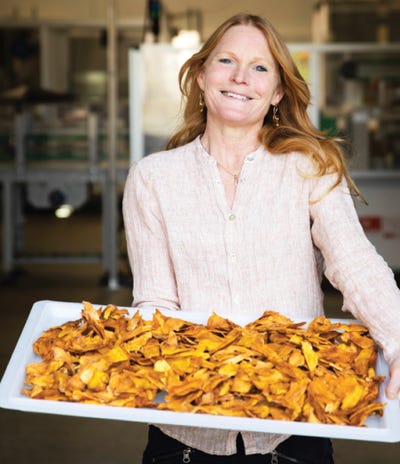Authenticity matters: How brands can stay true to—and communicate—their values
CPG pioneer Jennifer Maxwell shares her advice for brand founders on everything from sourcing to manufacturing, communicating to storytelling, without losing sight of who they are.

A 2022 Harris Poll survey found that a staggering 82% of shoppers prefer a consumer brand’s values to align with their own, and they’ll vote with their wallet if they don’t see a match. As more consumers turn to products that they feel are good for their bodies and communities, brands that authentically embody those values must share their stories clearly.
Know your brand story
Authenticity begins with knowing your brand’s story. Mine began in the mid-1980s when, aside from a few granola bars, there really were no bars available for athletes that provided energy and optimum nutrition and were easily digestible. When my late husband, Brian, and I created PowerBar in our kitchen, we never imagined we were launching a global energy bar category that today is valued at $3.2 billion.
I returned to the category by launching JAMBAR in late 2021. While the energy bar market is now crowded and competitive, I identified a need for a product made from only premium, real-food organic ingredients. So with JAMBAR, our differentiators are that you can “eat all of our ingredients off of a spoon,” and we donate 50% of profits to organizations that support music and active living.
When thinking about your brand story, why exactly did you create your product? What need does it uniquely meet? Who was involved in the creation of your product? How are you different from your competitors? Make sure you can answer these questions confidently and that you can convey your story clearly to partners and consumers.
Source ingredients selectively
Consumers are savvier than ever. Walk into any grocery store and, more often than not, you’ll see someone looking at a label. Increasingly, these shoppers are scanning for organic ingredients.
My advice for organic brands wanting to pass the “label test,” would be to spend the extra time it requires to research organic food suppliers and find the right organic ingredient food brokers. Before purchasing ingredients for your product, be sure to confirm that the organic certificate for each is valid and in good standing.
There are ample resources available to help brands find reliable organic suppliers. The Organic Trade Association’s Find.Organic links manufacturers with member suppliers. California Certified Organic Farmers (CCOF)—JAMBAR’s certifying agency—also provides a member directory to help brands find organic ingredients for their products. Leading organic certifier Oregon Tilth offers a member directory too, plus a guide to sourcing organic ingredients.
Other resources include regional organic meetups and conferences, as well as trade shows like Natural Products Expo West and Newtopia Now, where you can meet brokers and suppliers in person.
Micromanage manufacturing
Quality and consistency are critical for success. With JAMBAR, I wanted to have ultimate control over our manufacturing process, so we created our own state-of-the-art facility dedicated to the production of our bars.
If having a dedicated facility isn’t feasible, I’d recommend finding a co-packer that aligns closely with your product specs and values. For example, if your product is organic, make sure the co-packer either produces only organic products or has dedicated equipment or facilities for organic manufacturing, plus all of the proper certifications. If your product is vegan or nut free, make sure a co-packer can effectively prevent cross-contamination.
Finally, before partnering with any co-packer, understand the level of access to the facility you can have on production days.
Forge face-to-face connections
In running an organic brand in today’s market, I try to keep in mind that communication is what makes us human. Sometimes, when there’s a lot of technology involved, effective communication goes out the window. I’m seeing this happen with sales, in distribution and sometimes in marketing and brokering. Communication can become challenging, and you can lose a little bit of the essence of what you want to accomplish and what makes you different.
Whether communicating with retailers, brokers, distributors, suppliers or consumers, nothing beats real-time, face-to-face interactions. Stop by a store. Meet the category buyer or store manager, tell them your story and learn more about theirs. Or, if an in-person exchange is not possible, pick up the phone and check in with your partners. With so much communication taking place electronically, these kinds of interactions go a long way.
Likewise, make sure your marketing to consumers is genuine and authentic and that, beyond just digital communications, it also includes in-person components. At JAMBAR, we stay true to our brand values by sponsoring a number of sports and music events. Not only do these kinds of interactions help build trial, but they give you the chance to engage directly with consumers and receive real-time feedback.
Partner with authentic influencers
JAMBAR also works with a number of athletes and musicians who reinforce our authenticity, share our brand message and help us reach their followers. But the key is finding influencers who actually love your product!
Today’s smart consumers can tell the difference between someone who has been paid to promote a product and someone who genuinely believes in and uses a brand. So before partnering with influencers, make sure their values align with yours and that they will be an authentic champion of your brand.
Jennifer Maxwell is an athlete, musician, mom, co-founder of the original PowerBar energy bars and founder and CEO of JAMBAR organic energy bars, based in San Rafael, California.
Read more about:
IdeaXchangeAbout the Author(s)
You May Also Like




